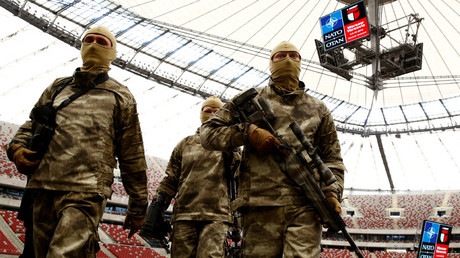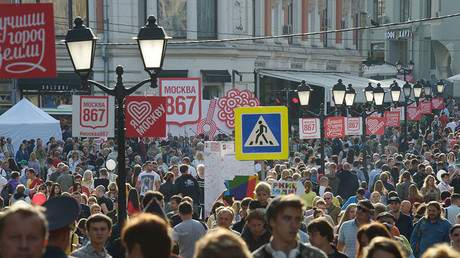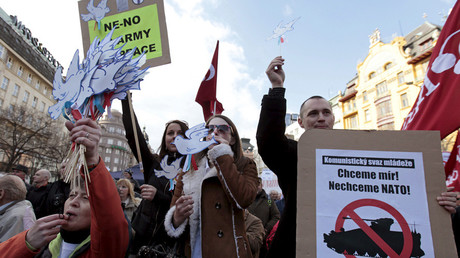Memo to NATO: Europe can't be ‘whole and free’ without Russia
Bryan MacDonald is an Irish journalist, who is based in Russia
I
n advance of this weekend’s NATO summit, the organization’s former head, Anders Fogh Rasmussen, took to the pages of Newsweek to deliver a customary anti-Russia diatribe. While delusional, his talking points give indication of NATO’s current thinking.
So, you are Anders Fogh Rasmussen, the recently replaced head bottle-washer at NATO and you need to get your name back out there. After all, there’s lobbying work to pitch for. Indeed, a few of those think tank “senior fellowships” could keep things ticking over. You might also want people to be aware that you are the founder and chairman of ‘Rasmussen Global,’a very important sounding thing with a flashy website.
Rasmussen Global offers ‘consultancy services’, ‘speaker services’ (sic) and ‘speeches and writing.’ On it you can find Anders Fogh looking all statesmanlike in photos with Ban Ki Moon, Barack Obama, Angela Merkel and David Cameron. Although, the latter may be for the chop soon as he’s about as popular in Washington these days as a Dallas Cowboy’s linebacker.
What better way to get some attention for your new enterprise than launch a well-timed assault on Moscow, via the pages of Newsweek, a few days before NATO gathers in Warsaw for its annual party?
Different Orbits
Rasmussen’s Newsweek piece covers the usual NATO talking points. For instance, how the West and Moscow are engaged in “a clash of ideas,” which invokes the sound of the 1970’s calling and asking for its foreign policy back. As Russia is not the USSR and hardly trying to impose communism on the world, it’s unclear what he means. These days, Russia and NATO members all equally embrace liberal capitalism in the economic realm; there are no restrictions on movement of people or capital and no overwhelming religious or ideological disagreements. That’s hardly a recipe for a “clash of ideas.”
Our hero also tears into RT, accusing this network of spreading “misinformation about the trade deal between the EU and the United States” (TTIP). He adds that “the Kremlin is trying to undermine a future source of creativity and prosperity.” Now, hold it right there, Anders Fogh. Firstly, it's actually impossible to spread fully accurate, or inaccurate, news about TTIP because nobody knows what exactly is in it. In fact, even EU MEPs aren’t quite sure what it contains. Witness this videofrom an Irish representative, Luke ‘Ming’ Flanagan, where he says he was banned from transcribing notes verbatim from texts relating to the controversial negotiations.
Also, the biggest threat to TTIP’s implementation comes not from Russia, or RT, but from France. The French President, François Hollande, has already warned that Paris would reject TTIP “at this stage” because it’s opposed to unregulated free trade. France, incidentally, is a member of NATO.
Putin, phone home
Rasmussen goes on to write that “in order to protect our way of life, European allies should come to terms with the fact that strong NATO deterrence, unity and defense of friends and principles are more important than the cost of economic sanctions against Russia or the potential prize of a rapprochement with Moscow.”
In other words, Rasmussen is calling for eternal conflict with Russia in order to give NATO a reason for its continued existence and to keep its gravy train rolling. Not to mention the use of the phrase “protect our way of life” would make you think he’s talking about extraterrestrials or some such.
Next up is a suggestion that “lack of resolve and unity vis á vis Russia will only strengthen Moscow’s wicked view that it can meddle in its neighbors’ affairs to preserve its self-perceived “sphere of interest.” Anders Fogh seems to seriously believe that Russia should have no stake in military agreements that may threaten it. Does he also imagine that America would ignore a Russian martial alliance with Mexico or Britain would stand idly by if Ireland attempted to coalesce with Moscow?
Rasmussen then signs off with the words: “a successful outcome at the Warsaw Summit would move us one step closer to a Europe whole and free.”
Full and at Liberty
The phrase “Europe whole and free” dates from 1989 and it originates from a speech by the first President Bush. Speaking in Germany, he delivered his vision for the continent’s future as the communist experiment was imploding across its east. Around the same time, the Soviet Union’s final premier, Mikhail Gorbachev, proposed his idea of a “Common European Home.”
Both goals were similar in that they envisaged a form of European unity. However, the Bush concept demanded it be controlled from Washington using existing American-dominated institutions, such as NATO, and modeled on the system of “liberal democracy” favored by the US. Furthermore, an obvious flaw in Bush’s plan was the lack of a suitable role for Russia.
Even amid the chaos of the 1990’s, it was obvious that Russia couldn’t be easily subsumed into the Western order. Its sheer size meant the European Union was essentially a non-runner because it would eventually come to dominate it; France and Germany had no hunger to relinquish their preeminence in that regard. And NATO membership wasn't an option for Russia either because if Russia entered the alliance, it would then have no reason to exist. In the words of its first Secretary General, Lord Ismay, NATO’s purpose is “to keep the Russians out, the Americans in, and the Germans down.” So, obviously, bringing the Russians in now would torpedo the whole thing and destroy the comfortable livelihoods of people, many very influential that depend on it.
Moscow was not Berlin
Either through arrogance or naivety many Washington opinion formers and leaders seemed to believe, for a long time, that Russia would ultimately end up like modern Germany, subservient to American military power and martially feeble. But that never made sense because the USSR wasn’t defeated by an outside power, nor was it occupied. Instead it voluntarily dissolved after the economic system broke down and pretty much all national elites decided they’d had enough. There was no ‘stunde nul’ (or zero hour) as the Germans refer to midnight on May 8th, 1945 when the Nazi command surrendered.
Thus, in Moscow the thinking was different. The Kremlin saw the USSR collapse as an opportunity to restore Russia to its historic role as a European power. And that is why Gorbachev was speaking of a “Common European Home.” The idea itself wasn’t even original. In fact, it was pilfered from Charles De Gaulle’s notion of "Europe, from the Atlantic to the Urals” which dated from 1962. Ironically, at the time, Gorby’s predecessor, Nikita Khrushchev, was furious at the suggestion, as he thought De Gaulle was attempting to undermine the USSR.
Thus, in Moscow the thinking was different. The Kremlin saw the USSR collapse as an opportunity to restore Russia to its historic role as a European power. And that is why Gorbachev was speaking of a “Common European Home.” The idea itself wasn’t even original. In fact, it was pilfered from Charles De Gaulle’s notion of "Europe, from the Atlantic to the Urals” which dated from 1962. Ironically, at the time, Gorby’s predecessor, Nikita Khrushchev, was furious at the suggestion, as he thought De Gaulle was attempting to undermine the USSR.
In 1987 Gorbachev said, “we are resolutely against the division of the continent into military blocs facing each other, against the accumulation of military arsenals in Europe, against everything that is the source of the threat of war.”
Sadly, that is what has now happened. And the reason for it is that Washington and Moscow can’t agree on where Russia should fit into Europe. Russia wants in and America wants to keep it out - in order to keep itself in. This is square peg in a round hole stuff and the longer it continues the more unstable and dysfunctional the continent is going to be.
Because Russia is Europe's largest country, the continent cannot be“whole and free” without Russian involvement. No more than the USA could be entire without California, its biggest state. To suggest otherwise is delusional. Alas, delusion is the name of the game in Warsaw this weekend.
Follow Bryan MacDonald on Twitter:@27khv
The statements, views and opinions expressed in this column are solely those of the author and do not necessarily represent those of RT.
https://www.rt.com/op-edge/350210-memo-nato-europe-russia/




0 Comments:
Post a Comment
Subscribe to Post Comments [Atom]
<< Home